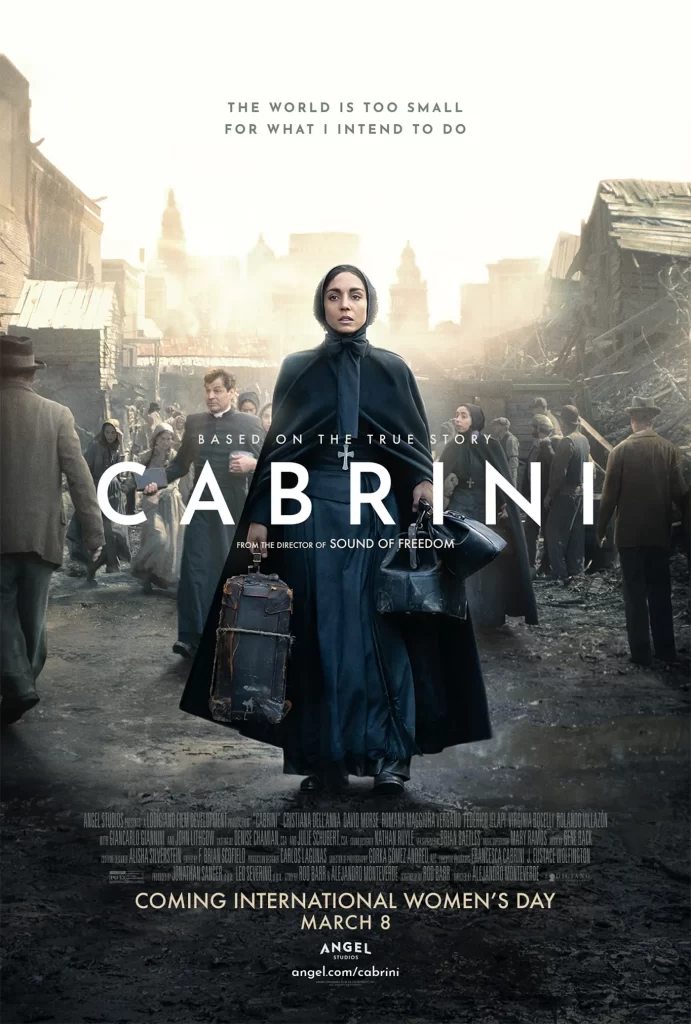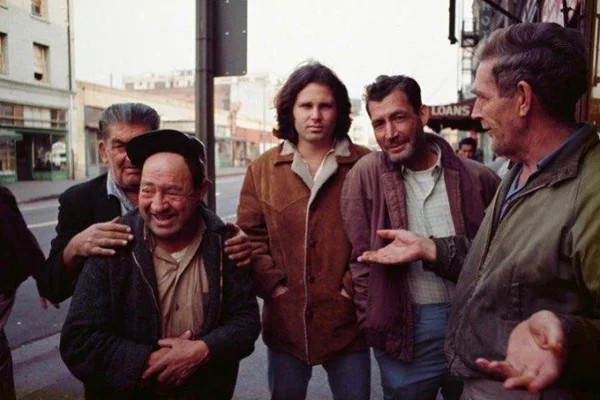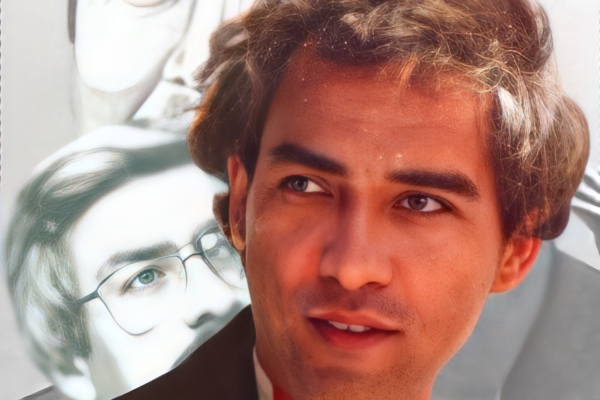A Miraculously Impressive Film About the First American Saint
It is also a timely movie for the world, in a period of racial prejudice, immigration fears and oppressive politics, no story rings truer to the plight of people trying to make a better life in America.
Review by Mike Szymanski
Perhaps a story about a nun who becomes a saint is not a movie you’d sit down and care to watch, but this is not that.
Maybe you think that a movie that involves nuns may make you think that there is a lot of singing and sweetness.
Or, perhaps a bio-pic that takes place in the early 20th Century may seem stale and dated.
Well, you would be wrong to all of the above.
This movie “Cabrini” is a true masterpiece about a piece of history you may not ever have heard of. It is dramatic, poetic, inspirational, tragic and awe-inspiring. Not only are there incredible settings and breathtaking camera work at some of the most iconic religious places in the world, but it’s all set to a stupendous musical score.

Rating: 10/10
Director: Alejandro Monteverde
Writers: Rod Barr and Alejandro Monteverde a
Style: Bio-pic
Time: 2 hours and 20 minutes
Trailer: https://www.youtube.com/watch?v=bPwnYlJ2L_c
Not only is it a seat-of-your pants thriller where you’re not sure what is going to happen one scene to the next, but the acting on all fronts is picture perfect.
This is the story of the first female saint in history recognized by the Catholic Church. And yet, it is far from a religious movie.
It is also a timely movie for the world, in a period of racial prejudice, immigration fears and oppressive politics, no story rings truer to the plight of people trying to make a better life in America.
Even the Catholic hierarchy warn Mother Cabrini that “You have swatted the hornet’s nest and neither I nor anyone else can protect you from what may come.”
Not only is this a story of the true miracle of a nun completing her passion to help hungry children throughout the world, but it is also a fight by a woman in an all-man’s world doing something that women are simply not supposed to do.
At the beginning, the scroll reads that this is a true story, and it’s a rather remarkable one. Yes, this is about a woman who becomes a saint, but the movie does not show any of the miracles that she purported to do to become a saint, and that is even more fascinating.
Two of the four miracles she is credited with happened after her death when hopeless parents prayed to her for their children, and they were cured. Two were healed by Cabrini herself. None of that is shown in the movie.
The film starts up with a boy running desperately with his mother in a cart screaming for help in Italian. He goes to a hospital that turns him away because he is an immigrant, and anyway, it’s too late, his mother is quite dead.
This story is about the founding of America on the backs of immigrants, and it’s the same story that can be told of the Jewish, Polish, Irish and many other communities. Mother Cabrini creates safe spaces and hospitals for all of them, and she spread her ministry to every continent in the world.
The early scenes of the movie begin in the beautiful Italian countryside of Codogno, where a young and frail Francesca Cabrini is restless and wants to do more. She takes her quest to fight for health and happiness of immigrant orphans directly to Pope Leo XIII played superbly by Giancarlo Giannini (“Love & Anarchy,” “Seven Beauties” and two James Bond films).
Giannini seems to relish playing the part of the stern, but protective nun whom he is humored by, but supports her to the end.
She wants to start in the Far East and work her way around the world, but the Pope suggests starting in New York, and in 1889 she tackles the impoverished children living in the New York slums rife with disease and crime.
Not only does the nun struggle with the local politicians and the language barrier, but she finds herself ill with weak lungs that threaten to take her life in a matter of years. Of course, it doesn’t, but she hacks her way through until the end.
Cristiana Dell’Anna is the actress who plays the pale and weak nun, whose beauty shines through the smudges on her face and the disappointments she faces. She keeps it all inside through her sallow cheeks and delivers an awards-worthy performance.
The nun crosses some very high-powered American actors as she battles their anti-immigrant prejudices. John Lithgow channels the hard-ass father in the movie “Footloose” that won’t let Kevin Bacon dance with his daughter, and he is also the most horrendous of the serial killer villains in the “Dexter” series. Lithgow plays Mayor Gould who tries to thwart the nun’s attempt at establishing anything for the poor in his city.
In a funny moment, the nun turns to the New York mayor and predicts: “Someday there will be an Italian in this office, and he will not be cleaning it.” Three decades later, Fiorello La Guardia took the reins of the city, and of course Rudy Giuliani as mayor was the son of Italian immigrants.
And then, there’s actor David Morse (“Contact,” “The Green Mile” and Dr. Boomer on TV’s “St. Elsewhere”) who plays the New York Archbishop Corrigan, who doesn’t welcome her with open arms, but curiously follows what she is doing, despite giving the nun severe restrictions, like not fundraising from anyone other than fellow Italians (who have nothing to give).
Director and co-writer Alejandro Monteverde is known for dramatizing true stories, as he did with the much-acclaimed “Sound of Freedom” about a former government agent who rescues hundreds of children from traffickers. The director was brought up Catholic and became fascinated with the story of this woman who almost single-handedly founded a mission, free school and hospital while facing enormous odds.
The Mexican filmmaker who also won the People’s Choice Award at the Toronto International Film Festival for his movie “Bella,” is known for focusing on family and faith in his work. He, himself founded a nonprofit Hope for the Children organization that helps provide education to underprivileged children in Mexico.
The movie is being produced by Provo, Utah-based Angel Studios, whose chief operations officer Liz Ellis said of Cabrini: “She is one of the most influential figures in modern history, and yet few know her story. Faced with seemingly insurmountable life obstacles, Cabrini chose instead to focus on how she could change the status quo in her time, and her impact on the world is still felt today.”
The music is orchestrated by Korean composer Gene Back, and the score is both operatic and classic, and swells with the dramatic scenery captured on screen.
The music reflects Mother Cabrini’s emotions that she keeps so well inside, especially when she is stingingly told “stay where you belong” and it’s repeated over and over again to her by various people.
Mother Cabrini eventually meets the “impossible boy” who was trying to save the dead mother who we meet at the beginning of the film. Paolo, the boy, is portrayed by young, accomplished actor Federico Ielapi, who pulls a gun out at the orphanage and wants to steal from the nuns. Mother Cabrini handles it very well, and Paolo changes for the best.
Taking over the constructing of a hospital, Cabrini insists that at least half of the workers hired be Italians, and that they get paid the same wages as other workers. People balk, but she wins. And then, there are other setbacks.
She also storms the Italian senate where women are not allowed in and makes a plea for help for their fellow countrymen who have tried to make better lives for themselves, but have hit stumbling blocks.
Mother Cabrini is listed as a postmortem producer of the film project. By the time of her death in 1917, she founded the Columbus Hospital and 67 other missionary institutions to serve the sick and poor worldwide. Her hospitals still exist today.
In 1946, Pope Pius XII canonized her as a saint and she became the Patroness of Immigrants.
Angel Studios plans to open the film nationwide on Women’s Day which is March 8, 2024.





